| |
President
Truman was SETUP!! |
|
One
of the dictionary definitions of SETUP:
"A
prearranged situation or circumstance, usually created to fool
or trap someone; trick; scheme." |
BAPTIST
President Truman was SETUP by the events surrounding the sudden death
of President Roosevelt and the dropping of the atomic bombs on Japan.
Just
like the Iraq war today is a SETUP with "REPUBLICAN" President
Bush surrounded by right wing "Evangelical Christians" advisers
who are also referred to as neocons or theocons.... The Republican
party is the party of President Lincoln
and he would be the very last person in the country to get involved
in foreign wars!!
President
Truman was one of the GREATEST U.S. Presidents!!
President
Truman was one of the greatest U.S. Presidents....He blocked Jimmy Byrnes
and Nelson Rockefeller from stealing the Presidency by sneaking in the
back door through the State Department and he stood up to the Pentagon
and General MacArthur during the Korean War.
President
Truman's reputation has been tarnished however by the dropping of 2
atomic bombs on Japan in August, 1945. Many people say that the war
was almost over and that the use of the bombs was unnecessary.
On
August 6, 1945, a uranium atomic bomb was dropped on Hiroshima, Japan.
On August 9, another bomb—a plutonium bomb— was
dropped on Nagasaki, Japan. This year is the 62nd anniversary of that
dreadful event.
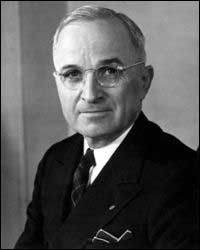
President
Harry Truman (1883-1972).
President from April 12, 1945 to Jan. 20, 1953.
|
|
President
Roosevelt was poisoned and died suddenly on April 12, 1945. His
Vice-President, Harry Truman was sworn in the same day.
Roosevelt
HATED Harry Truman and never took him into his confidence or prepared
him in any way to assume the duties of President. President Truman
described Roosevelt as "the coldest man I ever knew."
President
Truman had no knowledge of the Manhattan Project but he did suspect
that vast quantities of money were being spent on a super-secret
project.
President
Truman was a Baptist but ALL the hierarchy in the Roosevelt
Reich administration were Roman Catholics by religion.
Harry Truman
might never have become President if it was not for the sudden
death of President Roosevelt on April 12, 1945. |
The
reasons for the sudden death of President Roosevelt!!
There
were at least 2 main reasons for the sudden death of President Roosevelt
on April 12, 1945:
| 1. |
President
Roosevelt had an agreement with Stalin and Churchill that Russia
should conquer Berlin. |
| 2. |
President
Roosevelt was willing to receive a delegation of atomic scientists. |
President
Roosevelt met with Joseph Stalin and Prime Minister Churchill at Yalta
in February, 1945. It was agreed at that conference that the Russians
should take the Nazi headquarters of Berlin. This was only fair since
the Russians had lost over 20 million men defeating Nazi Germany and
Berlin was the Nazi capital.
By mid April 1945,
the Russians were just over 100 miles (160 kilometers) from Berlin.
However, the Allies were advancing swiftly across Germany at the same
time and the Nazis were very anxious to surrender to the British
or U.S. forces. Berlin lay within easy reach of the Allies.
It was at that critical
juncture in world history that President Roosevelt died suddenly....Joseph
Stalin understood immediately that Roosevelt was murdered and that the
agreement between the Big Three would be null and void. Berlin could
surrender to the Allies and Hitler and his henchman might yet escape
their just retribution.
Stalin ordered an
immediate all out assault on Berlin with absolutely no consideration
for the casualties involved (about 80,000 Russians killed, 275,000 wounded).
Berlin was finally taken by the Russians on May 2, 1945.
Roosevelt
was ready to meet with a delegation of atomic scientists
President
Roosevelt had an appointment to meet atomic scientist Leo Szilard on
May 8th, 1945. Szilard wanted to discuss the possibility of giving the
Japanese a demonstration of the terror weapon before dropping it on
a city. Here is a quote from Assistant President Byrnes himself:
"A
few days after the committee was appointed, President Truman referred
to me a letter addressed to President Roosevelt by Dr. Albert Einstein,
dated March 25, which was in President Roosevelt's
office at the time of his death at Warm Springs. In it Dr.
Einstein requested the President to receive Dr. L. Szilard, "who
proposes to submit to you certain considerations and recommendations."
After citing Dr. Szilard's reputation in the scientific field, Dr.
Einstein went on to say that Dr. Szilard was concerned about the lack
of adequate contact between the atomic scientists and the Cabinet
members who were responsible for determining policy. Dr. Einstein
concluded with the hope that the President would give his personal
attention to what Dr. Szilard had to say"
(Byrnes, All In One Lifetime, p. 284).
President
Roosevelt never met the atomic scientists . . . because he was murdered!!
Once
the dogs of war are unleashed; nobody but the Almighty can foretell
what the outcome will be....President Roosevelt made an appointment
to meet Leo Szilard on May 8th, 1945:
"It
worked; the White House, after receiving the letter of introduction,
set an appointment for Szilard to present his memorandum on May 8.
Szilard was in his office at the University of Chicago on April 12,
looking over a final revision of his views for Roosevelt's reading,
when there was a knock at the office door. Another member of the Manhattan
Project told Szilard that he had just heard on the radio that FDR
had died." (Robertson, Sly and Able: A Political
Biography of James F. Byrnes, p. 400).
White
House physician says Roosevelt was in good health on April 12
Agreeing
to meet a delegation of scientists who opposed the atomic bombing of
Japan was a death warrant for Roosevelt....Roosevelt traveled to Warm
Springs, Georgia, in late March to take a vacation and RECOPERATE from
the stress of his 14,000 mile round trip to Yalta to meet Churchill
and Stalin:
Dr.
Ross T. McIntyre was the White House physician in charge of President's
Roosevelt's health:
"When
Dr. Bruenn telephoned on Thursday, April 12, his report was most optimistic.
The President had gained back eight of his lost pounds and was feeling
so fit that he planned to attend an old-fashioned Georgia barbecue
in the afternoon and a minstrel show that evening for the Foundation's
patients. Every cause for anxiety seemed to have lifted, and given
another lazy, restful week, there was no reason why he should not
return to Washington on April 20 to greet the Regent of Iraq."(McIntyre,
White House Physician, p. 240).
Jimmy
Byrnes talked to the President via telephone a few days before his death
on April 12:
|
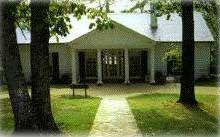
Roosevelt
cottage in Warm Springs, Georgia, where he died from food poisoning
on April 12, 1945.... He was only 63 years old!!
|
|
"To
this I can only give my opinion at the time. On several occasions
late in 1943 the President did look tired and overwrought, but we
were all familiar with his remarkable capacity to "bounce back."
This expression reminds me of a phrase often used by his personal
physician, Dr. Ross McIntire, who had him under daily observation:
"That man is like a rubber ball." I now realize that we
were perhaps too close to Mr. Roosevelt to note the deterioration
observed by those who saw him less frequently. Even
a few days before his death, when I telephoned him at Warm Springs
and he told me he felt much better, I thought from his voice and
the pungency with which he expressed his views that he had again
bounced back. This may help to explain why, little more than
a year before this, his friends had not questioned the wisdom of
his decision to run again." (Byrnes, All In One Lifetime,
p. 217). |
President
Truman was out of the country during the A-bombing of Japan!!
Just
as the most destructive war in the history of the world was ending,
the President of the United States was taken on an ocean voyage and
then sightseeing in Berlin, Germany!!
In order to prevent
President Truman from meeting with the scientists, he was SENT OUT OF
THE COUNTRY to Potsdam, Germany, to meet with Stalin and Churchill.
Unlike Roosevelt who flew to his meetings, Truman left by slow
moving ship on July 6, and did not return until August 7—the
day after the bombing of Hiroshima.
67 atomic had signed
a petition against the use of the bomb but Leahy, and Groves prevented
Truman from seeing it . . . until after his return!!
| 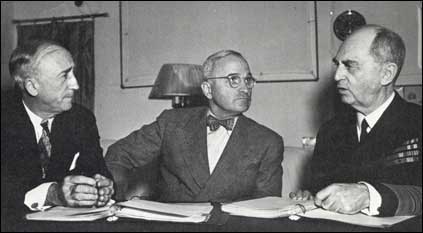
Jimmy
Byrnes, President Truman and Admiral Leahy. |
|
July
8, 1945—Admiral Leahy and Secretary of State Jimmy Byrnes
with President Truman aboard the Augusta on their way
to Potsdam, Germany. This was the most momentous time in the history
of world . . . and Truman was hustled out of the country.
Leahy, Byrnes and Groves wanted to prevent him meeting with the
atomic scientists who invented the bomb.
On July 17,
1945, the atomic bomb was tested for the SECOND time in Alamogordo,
New Mexico.
The Pentagon
was frantic to get Japan to surrender before the Russians
entered the war and they were itching to use their new
super weapon to force the Japanese to surrender!! |
The
3 men behind the dropping of the atomic bombs!!
These
3 men were behind the dropping of the atomic bombs on Japan. All 3 were
fanatical Fatima crusaders who HATED Russia and wanted to keep her out
of the Far East. They knew PERFECTLY well that Japan was defeated when
Germany surrendered in April, 1945. Stalin promised Roosevelt at Yalta
that Russia would declare war on Japan 3 months after Germany was defeated.
Immediately after the Nazi surrender, the
huge Soviet armies were deployed to the Far East.
All
3 of these men had perfect disguises.... Leahy and Byrnes were Irish
Roman Catholics who converted to the Episcopal congregation
while Groves was the son of a Presbyterian minister and Army
Chaplain:
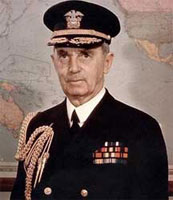
Fleet
Admiral William D. "Bill" Leahy
(1875-1959).
This
man was Chairman of the Joint Chiefs of Staff and had an office
in the East Wing of the White House next to Byrnes.
He
was the highest ranking military officer in the Roosevelt Reich
and he was boss of Groves and "Deak" Parsons.
|
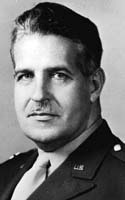
General
Leslie R. "Dick" Groves
(1896-1970).
This
man built the Pentagon and then became overseer of the Manhattan
Project to build the atomic bomb.
He had a perfect disguise. His father was a Presbyterian
minister and Army Chaplain who forgot to teach
his son ANYTHING about the Bible!!!!!
|
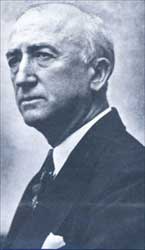
James
F. "Jimmy" Byrnes
(1882-1972).
This
man was Secretary of State under Truman from July 3, 1945 to
Jan. 1947.
Byrnes
was a Senator from South Carolina; a Supreme Court Judge, and
director of the Office of War Mobilization before becoming Secretary
of State. He was referred to as the "Assistant President."
|
President
Truman put James F. Byrnes in charge of the atomic bomb committee!!
|
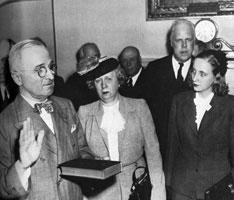
President Truman
took the oath of office as the 33rd President of the U.S. on April
12, 1945. |
|
The
new President was simply overwhelmed by his new responsibilities.
Nothing had prepared him for such a moment. Truman said "I
felt like the moon, the stars and all the planets had fallen on
me."
He
appointed James F. Byrnes as Secretary of State replacing Edward
Stettinius. When Truman heard of the atomic bomb from Byrnes he
appointed an Interim Committee to advise him on the bomb—with
Byrnes as its head!!
In
1944, Byrnes was actually the Vice-Presidential candidate instead
of Truman. Byrnes was not nominated because he was unacceptable
to blacks because of his racist views.
Byrnes
felt that HE should be the one taking the oath of office . . .
instead of Truman.
|
Truman
told the atomic scientists to "go see Byrnes."
President
Truman was certainly in over his head and he made Byrnes the head of
an Interim Committee to advise him on the new super weapon:
"President
Truman asked me to see Szilard, who came down to Spartanburg, bringing
with him Dr. H. C. Urey and another scientist. As the Einstein letter
had indicated he would, Szilard complained that he and some of his
associates did not know enough about the policy of the government
with regard to the use of the bomb. He felt
that scientists, including himself, should discuss the matter with
the Cabinet, which I did not feel desirable. His general demeanor
and his desire to participate in policy making made an unfavorable
impression on me, but his associates were neither as aggressive
nor apparently as dissatisfied.
In response to his statement that the younger scientists were very
critical of Doctors Bush, Compton and Conant, I asked him his opinion
of Oppenheimer. He quickly expressed enthusiastic admiration. I told
him then that he should feel better because the following week, upon
the suggestion of the three scientists about whom he complained, Dr.
Oppenheimer would meet with the Interim Committee. This pleased Szilard
and his companions, and the conversation passed to a more general
discussion of atomic matters. What they told me did not decrease my
fears of the terrible weapon they had assisted in creating.
These oppressive thoughts, and the burden of security, made themselves
felt in meetings of the Interim Committee. A
few days later, when I mentioned to General Groves the scientists'
visit to Spartanburg, he told me that he already knew of it; that
one of his intelligence agents had been following the three gentlemen,
as they followed others connected with the project. The diligence
of Groves impressed me then as it had done before" (Byrnes,
All In One Lifetime, pp. 284-285).
Byrnes
recommended the use of the bomb without any warning!!
Before
other bombing raids over Japan, the Pentagon had dropped leaflets warning
the Japanese that an air raid was coming. Byrnes was totally against
any warning. The Japanese were willing to surrender after Germany's
defeat . . . if they could keep the Emperor. If not they were willing
to fight to the death . . . and use their own atomic bombs on the invaders:
"On
June 1, 1945, our Interim Committee unanimously recommended to President
Truman that the bomb should be used without specific warning and as
soon as practicable against a military installation or a war plant
in the Japanese islands. It had been suggested that it first be used
against an isolated island with representatives of Japan and other
nations invited to observe the test. This alternative was rejected.
There was also the question of giving the Japanese fair warning about
the time and place of the explosion; but because we felt that American
prisoners of war would be brought into the designated area, this idea
was not adopted. We were also told by the experts that whatever the
success of the test bomb, they would not guarantee that another would
explode when dropped. Further, if we gave the Japanese advance notice
and then the bomb failed to explode, our optimism would have only
played into the hands of the Japanese militarists."
(Byrnes, All In One Lifetime, p. 285).
Atom
bomb cost 20 BILLION Dollars to develop!!
The
atom bomb cost 2 BILLION (20 BILLION in today's dollars) to develop
and over 200,000 people worked for 3 years on the Manhattan Project.
It was the largest and most expensive industrial project ever undertaken
in the entire history of the world:
"In
fact, S-1 was the largest scientific-industrial undertaking in history,
and the most important and best-kept secret of the war. Overall responsibility
had been given to the Army Corps of Engineers, with Groves, who had
overseen the building of the Pentagon, in charge. It had been launched
out of fear that the Nazis were at work on the same thing, which they
were, though with nothing like the seriousness or success that were
imagined. In less than three years the United States had spent $2
billion, which was not the least of the hidden costs, and, one way
or other, 200,000 people had been involved, only a few having more
than a vague idea of what it was about. That the diligent chairman
of the Truman Committee had known so little was a clear measure of
how extremely effective security had been. But then neither did General
MacArthur or Admiral Chester A. Nimitz or a host of others in high
command know what was going on.
While the United States and Great Britain shared in the secret and
technical-scientific details, it was in all practicality an American
project—initiated, supervised, financed, and commanded from
Washington. Ultimately it was Franklin Roosevelt's project, his decision,
his venture. Without his personal interest and backing it would never
have been given such priority. For Truman it was thus another part
of the Roosevelt legacy to contend with and again Roosevelt was of
little help to him. Roosevelt had left behind no policy in writing
other than a brief agreement signed with Churchill at Hyde Park the
previous autumn saying only that once the new weapon was ready, "It
might perhaps, after mature consideration, be used against the Japanese,
who should be warned that this bombardment will be repeated until
they surrender." (McCullogh, Truman, pp. 378-379).
President
Truman was relected in 1948
President Truman was reelected to the Presidency
in 1948 by an overwhelming majority of the people.
Even
with the end of the war, the Pentagon continued to dominate the affairs
of the nation and guarantee more foreign wars with the establishment
of NATO in Europe and the fake state of "Israel" in the Mideast.

Click to enlarge
President Truman taking the oath of office on
January 20, 1949.
|
|

Click to enlarge
President
Truman KISSING the BIBLE after taking the oath of office.
|
President
Truman stood up to the Pentagon and MacArthur during the Korean War!!
During the Korean
War, President Truman was again asked to authorize the use of nuclear
weapons . . . but this time he flatly refused to be a puppet of the
military . . . and saved the world from WWIII.
The faked North
Korean invasion of South Korea began on Sunday, June 25, 1950.
North Korea had vast supplies of uranium and a huge hydroelectric atomic
bomb producing facility at Hungnam (Hunan) which was built by the Japanese
during WWII. Russia now controlled North Korea and were producing their
own atomic bombs.
This was anathema
to the Pentagon planners who were determined to prevent Russia from
entering the exclusive nuclear club at all costs. And so the faked "invasion"
of North Korea was staged (just like 911) in order to provide a "moral"
pretext for the war of conquest and subjugation of North Korea.
When the war went
badly for MacArthur, he went crying to President Truman to authorize
the use of nuclear weapons against China. President Truman flatly refused
and reminded MacArthur that the Constitution made him
Commander in Chief of the armed forces. World peace was preserved when
the President fired MacArthur and that old soldiers finally faded away:

General
Douglas MacArthur (1880-1964), was commander of the Pentagon
forces that invaded North Korea to capture the uranium mines
and hydroelectric facilities.
|
|

In a speech on April 11, 1951, President Truman
announced that he was firing the firebrand MacArthur for insubordination
and threatening the peace of the world.
|
Vital
Links
Petition
to the President of the United States from 68 atomic scientists!!
References
Byrnes,
James F. All In One Lifetime. Harper & Brothers, New York,
1958
McIntyre,
Ross T., Dr. White House Physician. G. P. Putnam's Sons, New
York, 1946.
McCullough,
David. Truman. Simon & Schuster, New York, 1992.
Robertson,
David, Sly and Able: A Political Biography of James F. Byrnes.
W. W. Morton & Co., New York, 1994.
Copyright
© 2007 by Niall Kilkenny
Back to Main Menu
|










